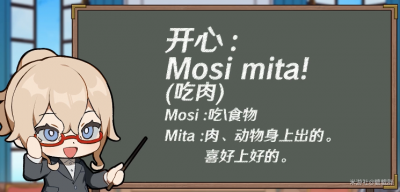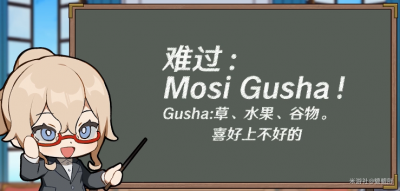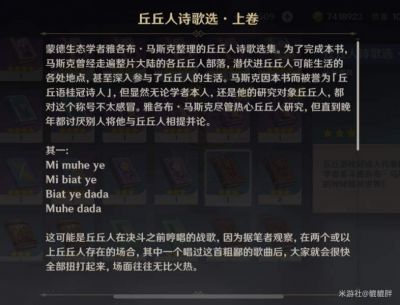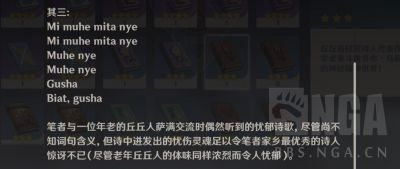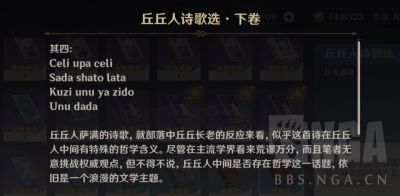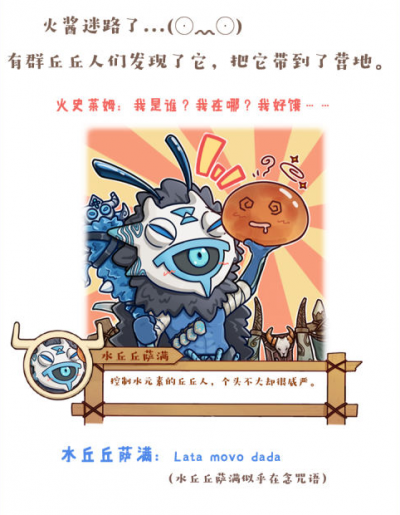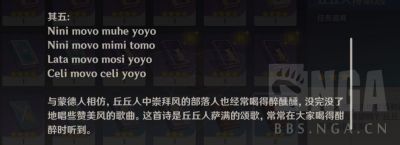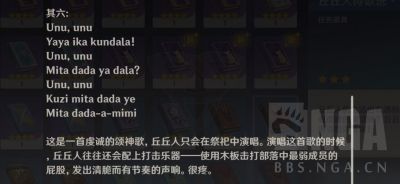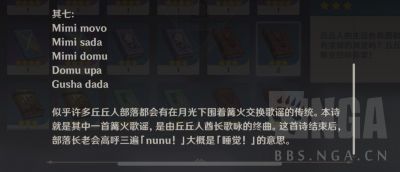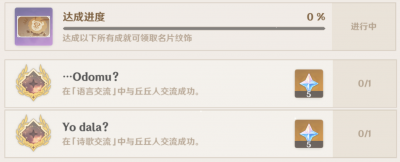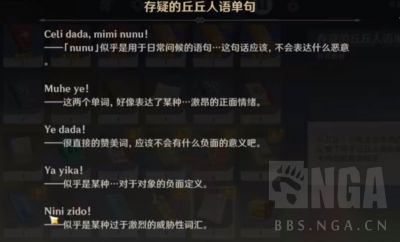If this is your first time here, press "Ctrl+D" to view updates at any time. If you think Wiki is fun, please recommend it to your friends Press "WIKI Function → Edit" in the upper right corner to modify the page content. Please click 。
。
MediaWiki:Timer
one 2020/12/3 0:0:0 This article was last updated , please pay attention to timeliness 。 This article is the original work of Pipipang. Please do not modify it without the permission of the author. Please indicate the source and attach a link when reprinting.
preface
This article has collected 15 pieces of information related to Qiuqiu language that have been published so far, including the official small theater of vocal excellence, the fifth episode of the official comic dialogue between Qiuqiu people, the daily part 4 of the comic Shremjam de Dou, the poetry selection of Qiuqiu people (including 7 poems), the research manual of Qiuqiu people (four volumes in total, the third volume is missing), and the related task achievements of Qiuqiu scholar (pseudo) Ella Mask. Our experts have translated the above materials with a high degree of completion, realized a high degree of logical self consistency of Qiuqiu language vocabulary, and attached analytical ideas for research and discussion with all Qiuqiu scholars.
The pronunciation of Qiuqiu language can be read directly in Roman. Many words come from Japanese, English, Russian, and Chinese. There is no obvious cryptology law, and it is difficult to learn more about the @ https://bbs.nga.cn/read.php?tid=23604939 The published Abyssal Kanraya language family was deciphered and analyzed. The sentence structure and word order of Qiuqiu language are complex and changeable according to different environments. The same word is used as a verb, noun or adjective in different contexts. Words and expressions in Qiuqiu language are relatively primitive, and the number of words is also quite scarce. All of the above have caused some difficulties to the deciphering work in the case of limited data.
It took us about five hours to decipher Qiuqiu language. Now we summarize all the known words of Qiuqiu language in the form of a dictionary at the end of the article. Even the beginners of Qiuqiu can easily translate and make sentences according to the dictionary.
Welcome all Qiu lovers to work with me to further improve and correct the Qiu language dictionary.
Analysis of Qiuqiu Language
1 Small Theater of Voice Excellence - Monde Tea Party
Resolution:
The official gave the contextual meaning of Mosi Mita and Mosi Gusha: mita is often accompanied by positive meaning, and Gusha is often accompanied by negative meaning.
2 One of Selected Poems of Qiuqiu People (Volume I)
Vocabulary:
Mi I
Mimi, we
Muhe wins, defeats, succeeds. Invincible
Beat up Biat
Ye You, a scornful name, mean to emphasize that your identity is higher than that of the other party. Use yo when being friendly
Dada is excellent, positive, and can express praise; Very emphatic.
Poetry:
——Mi muhe ye
——Mi biat ye
——Biat ye dada
——Muhe dada
Scene: The battle song of the hills before the duel starts after singing
Source: excerpted from the first part of Selected Poems of Qiuqiu People Volume I
Translation:
——Mi muhe ye I want to defeat you
——Mi bit ye
——Biat ye dada, beating you will be great
——Muhe dada's victory will be great
Resolution:
Mi in Qiuqiu language can refer to "I", Mimi refers to "we", and only has the function of simply distinguishing "one" and "many". The same goes for ye, yeye, yo, yoyo in the following.
As ye and yo are personal pronouns "you" with the same meaning, according to the context, the use of yo and yoyo is often a friendly communication. For example, in the friendly state of (11), the reply of the Qiuqiu people to the Qiuqiu scholar Ayra Mask Yo mimi beru si? (What do you want to do here?) and (6) the Shaman's Praying Poem Praise - Nini movo muhe yoyo (May the storm bring you victory); When you use ye, you belittle the other party. It is translated as you guys, you guys, who often use it in battle or when high ranking people talk to low ranking people For example, in (7), the god Wunu replied to the question of the Qiuqiu people Kuzi mita dada ye (Wunu replied: of course, your powerful Qiuqiu people are more powerful) and in (1), the provocative war song Mi muhe ye (I will defeat you)
3 Selected Poems of Qiuqiu People Volume I (II)
Vocabulary:
Eleka at this moment (doubtful, no other information)
-A-ah, modal particle
Domu Dance
Lala~modal particle
Poetry:
——Eleka mimi-a-Domu
——Mita domu-a-dada
——La-La-La
——La-La-La
——Mimi mosi ye mita
Scene: carnival, tribal hymn
Source: From Selected Poems of Qiuqiu People (Volume I) (II)
Translation:
——Eleka mimi-a-Domu, now we are all dancing together
——The dance of Mita domu-a-dada is very good
——La La La
——La La La
Mimi mosi ye mita We are all very happy Mosi mita means happy See (1), of course, the literal translation is "we eat your meat" to express the cruelty and power of the tribe
Resolution:
This paragraph describes the tribal festival. The original festival is mainly about sacrificial dance, so it is analyzed that domu may mean dance. Combining sada (singing) in (5) and sada and domu in (8), it is determined that domu means dance.
As for Eleka, it can only be inferred as a function word. In the second part of (9) Survey of Qiuqiu People's Customs, it is mentioned that QQ people have no concept of the past and the future, only "now". It is speculated that eleka means the present moment, and no more information is available
With regard to mita, we can infer that mita not only means notional meat, but also can be extended to Qiuqiu people, Qiuqiu people settlements, or Haorou people
4. Selected Poems of Qiuqiu People (Volume I) (III)
Vocabulary:
Nye means no, no, no
Poetry:
——Mi muhe mita nye
——Mi muhe mita nye
——Muhe nye
——Muhe nye
——Gusha
——Biat,gusha
Scene: Shaman's melancholy poem, sad tone
Source: From Selected Poems of Qiuqiu People (Volume I) (Part III)
Translation:
——Mi muhe mita nye I can't hunt
——Mi muhe mita nye I can't hunt anymore
——Muhe nye, I'm not invincible anymore
——Muhe nye I am no longer strong ..
——Gusha is sad
——Biat, Gusha, I'm so sorry
Resolution:
This paragraph describes the elegy of the old shaman, so it is a sad and depressed atmosphere. Combined with the prompt in (12) that muhe indicates positive emotions, it is presumed that nye means negative.
Biat complains that his pronunciation may be borrowed from Russian blyat
The original translation of Mi muhe mita nye is "I am no longer a powerful Qiuqiu person". Thanks for @ nazuurin's correction. Through semantic analysis of the following pronouns+verbs+pronoun phrases,
——Mi muhe ye
——Mi beat ye
——Biat ye dada It's great to beat you
——Mi muhe mita nye
——Nini movo muhe yoyo Wind Belt Victory for you
——Mimi domo, dance
——Mimi nunu, everyone sleep
——Nini zido Storm Kill
We can analyze the grammar law of Qiuqiu language: the subject producing the action is in front of the verb, and the object receiving the action is behind the verb.
However, there are two special cases of continuous stacking of pronouns:
——Kuzi unu ya zido
——yo mimi beru si? What do you want to do with us?
It can be seen that when pronouns are stacked, they mean A and B xxxx, which is logically consistent and consistent with the grammar
5. Selected Poems of Qiuqiu People (Volume II) (IV)
Vocabulary:
Celi Element
Upa aggregation
Sada sings and praises
Shato accompanied
Lata water element, water flow
Kuzi Powerful
Unu, the god worshipped by the Chuqiu people
Zido, kill
Ya refers to a human
Yaya refers specifically to the plural of human beings. Many human beings
Poetry:
——Celi upa celi
——Sada shato lata
——kuzi unu ya zido
——Unu dada
Scene: It has special philosophical meaning among Qiuqiu people, similar to ancient poetry and romantic literature
Source: From Selected Poems of Qiuqiu People (Volume II) (IV)
Translation:
——Celi upa celi elements and elements converge together (agglomerate elements!)
——Sada shato lata
——Kuzi unu ya zido
——Unu dada Praise Unu
Resolution:
Unu appears many times in the following text, especially in the hymn to god in (7), there is a call to un u every other sentence. Here is another sentence to praise un u, so un u is determined to be the god worshipped by the Qiuqiu people
Ya refers specifically to human beings, because the Qiuqiu people will yell "ya!" or "yaya ika!" when they see players! It can be understood that these two words both mean hostility.
If ya specifically refers to human beings, ika means hostile, enemy. In this paragraph, ya zido (zido human) also means hostility, and in combination with the context in (13), nini zido (wish the wind zido) means a strong threat, so it is determined that zido means to kill, which is a strong threat tone.
Sada has excluded the meaning of dance in (4). In combination with the poem extolling the wind (6), the wind brings victory. Lata movo mosi yoyo (may lata bring you food). It is speculated that lata is highly related to the element of water, and celi is most likely to refer to all elements.
This is confirmed in the official cartoon of the Qiuqiu people, the Shrim sauce de bean daily part 4, the water shaman mantra lava movo dada (may the water flow bring good luck), as shown below:
6. Selected Poems of Qiuqiu People (Volume II) (Part V)
Vocabulary:
There are a lot of wind elements in Ni. Ni should refer to wind
Brought by Movo
Yoyo is your plural. Qiuqiu people say yoyo when they are friendly, yeye when they are sarcastic, angry or angry
The meaning of "Tomo" is unknown. Nouns and context can be inferred as gratitude and satisfaction. Learn from Japanese
Poetry:
——Nini movo muhe yoyo
——Nini movo mimi tomo
——Lata movo mosi yoyo
——Celi movo celi yoyo
Scene: Shaman in the Wind Tribe praises the power of wind elements after being drunk
Source: From Selected Poems of Qiuqiu People (Volume II) (Part V)
Translation:
——Nini movo muhe yoyo May the wind bring you victory
——Nini movo mimi tomo May the wind bring you satisfaction
——Lata movo mosi yoyo may water bring you food
——Celi movo celi yoyo May elements bring you elements (May elements be with you)
Resolution:
Celi xx Celi has caused great interference to the translation process, but every sentence here ends with yoyo (you), which is a votive poem of Shaman style.
The last sentence, "May the element bring you elements", is translated as "May the element be with you just right", so Celi means to be a real element.
Since we emphasize the tribes that praise the wind, words must be highly related to elements. The most frequently occurring nini must refer to the wind element, lata and water element, and movo is a verb in the sentence, which can be translated as "move", "bring", and is borrowed from the English pronunciation "move".
7. Selected Poems of Qiuqiu People (Volume II) (VI)
Vocabulary:
Unu, a deity worshipped by the Qiuqiu people, mentioned in the research manual of the Qiuqiu people that the Qiuqiu deity does not belong to the traditional seven gods
The plural of Yaya human, that is, a large group of human beings
Ika Enemy
Kundela translates as living, living people
Dala expressed doubts about which and what to do
Kuzi is powerful
Mita meat, which can refer to the tribe of Qiuqiu people
Poetry:
——Unu,unu
——Yaya ika kundala!
——Unu,unu
——Mita dada ya dala?
——Unu,unu
——Kuzi mita dada ye
——Mita dada-a-mimi
Scene: devout hymns to gods, used in sacrifice
Source: From Selected Poems of Qiuqiu People (Volume II) (VI)
Translation:
——Unu, unu
——Yaya ika kundala! A large number of human enemies are still alive!
——Unu, unu
——Mita dada ya dala? Which is more powerful (compared with human)
——Unu, unu
——Kuzi mita dada ye (Wunu replied) Of course, your powerful Qiuqiu tribe is more powerful.
——Mita dada-a-mimi! Our Qiuqiu tribe is the most powerful!
Resolution: Here, the meaning of un u spirit is explained in (5) The fourth line of the poem, mita (Qiuqiu people), should correspond to ya (human), and the meanings of mita and ya should be determined. There is a word kundala here. At first, I mistook it for attack. Thanks to @ SuperEgoFreud for correcting: a short play played in Big Viagra [1] At 5:04, Big Brother Niutou said that everyone should live a good life. Dala can be literally translated as "what?" to express doubt. Another Dala appeared in the 36 level task "Collect the Shield of Shining Will" and was confirmed: the common language Qiuqiu people facing Paimeng expressed doubts with "Dala?".
8. Selected Poems of Qiuqiu People (Volume II) (VII)
Poetry:
——Mimi movo
——Mimi sada
——Mimi domu
——Domu upa
——Gusha dada
——Nunu,nunu,nunu!
Scene: Campfire ballad. After singing, the elder shouts nunu three times, which means sleeping
Source: From Selected Poems of Qiuqiu People (Volume II) (VII)
Translation:
——Mimi movo, we harvest (transport)
——Mimi sada, we sing
——Mimi domu, let's dance
——Domu upa, get together and dance
——Gusha dada is happy even if he can only eat vegetarian food! (optimistic)
——Nunu,nunu,nunu! All right, all right, everybody sleep~!
Resolution: Inspiration suddenly came to mind that Dada Upa Valley was written in Roman sound, which is just dada upa. In connection with the local landform, there are a large number of mound tribes. The best upa can be understood as the best canyon? Or the best .. Settlement? This is it! The translation of upa as a noun can be used as a settlement and gathering place, then the best gathering place of dada upa can be explained; As a verb, upa is translated as gathering, condensing. In the context of "domu upa", it can be translated as gathering and dancing. In the context of "celi upa celi", it can be understood as shouting "condensing, elements!" before casting. So far, the meaning of upa has been determined.
9. Investigation of Qiuqiu People's Customs (II)
If there are surplus prey, the Qiuqiu people will put meat on the altar as a sacrifice
Qiuqiu people have no concept of the past and the future, but only live in the present
Source: The above excerpt is from the second part of Investigation on the Customs of Qiuqiu People
10. Say goodbye to Ella Musk at the Knights Library
Choose "Goodbye" in the dialogue
——Nye mita da ye mosi zido Goodbye and safe journey
Said by: Say goodbye to Ella Musk at the Knights Library
p. S. The bear child is a Zu'an (pseudo) Qiu expert. If you trust her, you will lose ... According to the senior Qiu scientist,
This sentence means that you will starve to death if there is no meat, and you should tell Qiu Qiu if you will be beaten. The real goodbye may be valo,
It is described in the analysis of (11)
11. Achievements in language communication with Qiuqiu people
Vocabulary:
Beru wants to, wants to do (not sure, only once)
Si things
Valo, thank you You're welcome
Guru guru describes the sound of tummy rumbling, hunger
Buka Barbecue, Barbecue
Todo, feel at ease
Dialogue:
Ella Musk: Olah! Muhe mimi,nye,eh..mosi aba?
Qiuqiu people: Yo mimi beru si?
Ella Musk: Buka... mita nye, guru guru... yo mosi ka?
Qiuqiu people: Ya odomu. Todo yo,buka guru-guru nye。
Ella Musk: Mi? Dada! Valo。
Qiuqiu people: Valo, ya odomu. (Seeing the actions of Qiuqiu people, Qiuqiu people are very happy) Get the Strange Barbecue Steak
Translation: Ella Musk: Olah! Muhe mimi,nye,eh。。 mosi aba? (Hello, we are very strong, no, uh... Do you have anything to eat~Abba?)
Qiuqiu people: Yo mimi beru si? (What are you doing here?)
Ella Musk: Buka... mita nye,guru-guru。。。 yo mosi ka? (There is no meat in the stomach. I'm hungry. Do you have anything to eat?)
Qiuqiu people: Ya odomu. Todo yo,buka guru-guru nye。 (Human friend. Here you are, and you won't be hungry.)
Ella Musk: Mi? Dada! Valo。 Can you give it to me? Great! Thank you
Qiuqiu people: Valo, ya odomu. (You're welcome, human friend)
Get the Strange Barbecue Steak
Resolution: Ella Musk's half baked words can't be believed completely. It's right to be half true and half false. Here, beru si and todo only appear once, and can only be translated literally through the context.
Qiuqiu people also said "dala si,
The pronunciation comes from the Chinese word "Shi". However, the meaning of beru is uncertain, and you are welcome to discuss it.
Valo can be understood here as "thank you" or "thank you". It can also be translated into "goodbye". More information in Qiuqiu people's language is needed for confirmation.
12. Ella Musk's self created vocabulary of Chuqiu language for you when receiving the task
Poetry:
Celi dada,mimi nunu! Praise element, let's sleep Nunu seems to be used in everyday language... This sentence should probably not express any malice
Muhe ye! You are invincible ——These two words express some kind of passionate positive emotion.
Ye dada! You guys are awesome ——It's a very direct compliment. It should not have any negative significance
Ye yika! You are the enemy ——It seems to be the definition of some negative object
Nini zido! May the storm kill you ——Seems to be some kind of overly aggressive threatening words
Origin: questionable documents in Qiuqiu dialect
Resolution: There are no obscure words, and previous translations have been self negotiated in this paragraph.
13. Dialogue between follow-up tasks and the three hills under the moon
Paimeng: What poem should I read first to make an opening for the people of Qiuqiu?
-Celi dada,mimi nunu! This one seems to have responded, but it doesn't seem to mean anything,
There is no way but to express what it wants to express through actions (Qiuqiu people start to dance). Pimeng thinks that Qiuqiu people seem very happy -Ya yika!
-Ye dada!
-Nini zido!
-Muhe ye!
Read on
I chose ye dada - I seem to have responded, but I still don't want to talk, and I'm still dancing
Muhe ye! Select all the people from Qiuqiu to start dancing and complete the achievement
p. S. According to our analysis of 7 poems written by Qiuqiu people, I believe you can understand them frankly
14. Ella Mask's own Chuqiu poetry
Vocabulary:
Kucha kucha click, onomatopoeia when eating grass. It can be translated as weak
Tiga rock element, rock
Poetry:
——Olah! Olah!
——Yoyo mosi mita!
——Nye,nye mosi mita,
——Yeye mosi gusha!
——Mosi gusha,mosi tiga,
——Yeye kucha kucha!
At last, let me translate the poem written by the unlucky girl herself. The mocking force is max, and when she goes out, she promises to be beaten by Qiu Qiu:
Olah! Olah! (Hello! Hello!)
Yoyo mosi mita! (You are very happy eating meat!)
Nye,nye mosi mita, (No, the meat is gone.)
Yeye mosi gusha! (You guys start to eat grass)
Mosi gusha,mosi tiga, (Eating grass and stones at the same time)
Yeye kucha kucha! (You are crunching your food. It's delicious.)
Resolution:
The rare word here is tiga, which must be a notional word according to the context, and similar to Gusha, it refers to food that is difficult to eat, so it is speculated that it may be rock or ore.
The king of the rock mound was once described as tiga mitono (unknown source), and mitono is a variant of mita (Qiuqiu people), which should refer to the king of the rock mound, so tiga should refer to the rock element, rock.
15.36 Level Main Line Shines the Shield of Will Task and Dialogue with Qiuqiu People
Vocabulary:
Vin's
Plata shield
Kucha pupu is an onomatopoeic word for eating grass, which means to laugh at the sound of creaking and puffing
Dialogue:
Traveler: Vin plata dada! This is the wine barrel shield for praising Qiuqiu people. It's really good. Qiuqiu people will be happy
If they choose to communicate in other human languages incorrectly, Qiuqiu people will say biadam and become unhappy
Traveler: kucha pupu gucha ye! (Not a positive word)
The Chuqiu people continued to say biadam and became angry
Traveler: mani nini biaodomu
Yaya ika! Kundala ye plata!
(Then a large group of Qiuqiu people beat up.)
Translation:
Traveler: Vin plata dada! (Your wine bucket shield is really good)
If you choose to communicate in other human languages incorrectly here, Qiuqiu people will say biadam, (you want to die)
Traveler: kucha pupu gucha ye! (It's funny that you are crunching and eating grass.)
Qiuqiu people continue to say biadam, (hateful ah ah)
Traveler: mani nini biaodomu
Yaya ika! Kundala ye plata! (A lot of human enemies are coming! You live man, take my shield!)
(Then a large group of Qiuqiu people beat up.)
This is the end of the translation. Welcome to speak freely about vocabulary understanding
Before the end, I will attach the first edition of Qiuqiu People's Dictionary to you. If you are interested, you can refer to it by yourself
Dictionary of Qiuqiu People's Language (First Edition)
A
-A-ah, modal particle
B
What does Beru Si do
Biadam, damn it, look for death, angry tone
Biat blows and beats violently; Abominable
Buka belly
C
Celi Element
D
Dada Excellent, powerful
Dala expresses doubts, and does not understand the set. What does it translate into
Domu Dance
E Eleka, right now
F
G
Guru guru onomatopoeia, which describes the sound of tummy cooing, hunger
Gusha plant food, not so good, sad
H
I
Ika enemy; Sometimes I also write yika, and yika has a stronger tone
J
K
Kundela alive/existing
Kuzi is powerful
Kucha pupu onomatopoeia, an onomatopoeia when eating grass, is used to describe eating grass with good taste, which is derogatory
L
Lala~modal particle
Lata water element
M
Mani gives
Mi I
Mimi We, the plural of mi
Mita meat, good, good thing, there are times of Qiuqiu people, Qiuqiu people tribe, and Haorou people
Mosi eats, eats
Mosi Mita eats meat and is happy
Mosi Gusha eats grass to express sadness
Movo brings and transports; It can be extended to harvest
Muhe victory, victory; successful
N
Ni wind
Nini A lot of wind elements, storm, gale
Nunu sleeps
Nye means no, no, no
O
Odomu friend, partner
Hello, Olah
P
Plata shield; Shield strike
Pupu onomatopoeia, puff, means ridicule
Q
R
S
Sada sings and praises
Shato rides, along with
T
Tomo is grateful
Todo, feel at ease
Tiga ore
U
Upa condensation, aggregation, aggregation; Settlement
Unu Wunu, a god worshipped by the Qiuqiu people
V
Valo Thank you You're welcome/Goodbye
Vin Wine, wine related, bucket lid
W
X
Y
Ya refers specifically to human, a human
Yaya is the plural of human beings, a large group of human beings
Ye You guy, a scornful name; Or used as a title for a person of high status to a person of low status
Yeye You guys, scornful name, the plural of ye;
Yo You, friendly address
Yoyo You, the plural of yo, call ye friendly
Z
Zido, kill
Related links:
Dictionary of Modern Qiuqiu Language
Qiuqiu language: from entry to burial
Qiuqiu Language: From Introduction to Earth
Benqiu scientists announced that they had basically deciphered the language of the Qiuqiu people and discovered the spirit of the Qiuqiu people, Wunu

